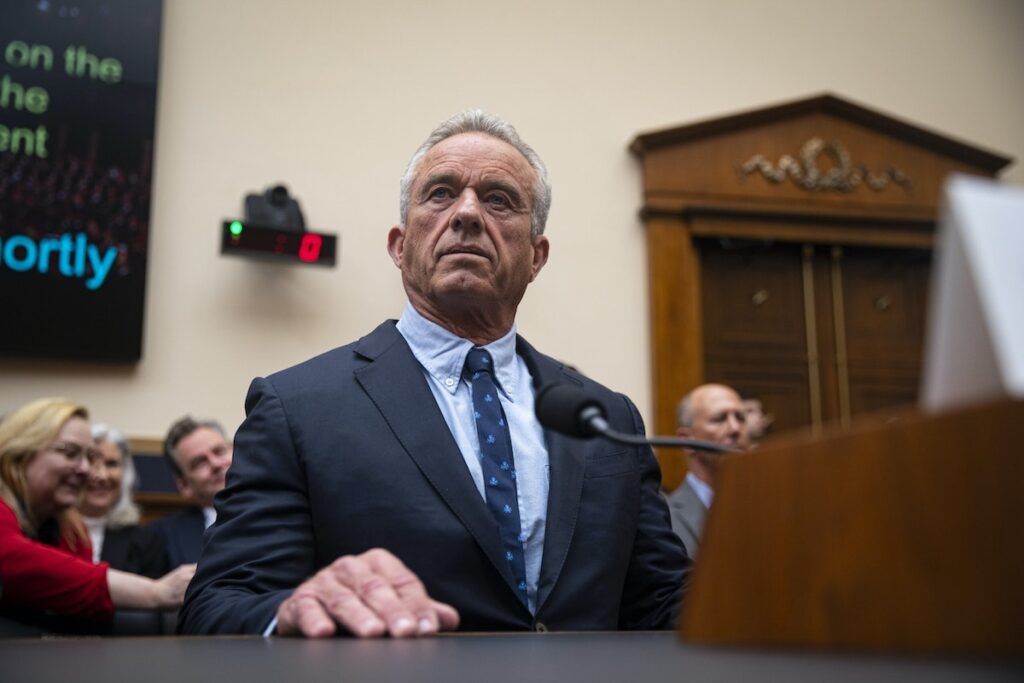Independent presidential candidate Robert F. Kennedy Jr. stunned audiences with a nostalgic ad during the Super Bowl on Sunday, eliciting a sense of déjà vu and turning around the tide of a thrilling game between the Kansas City Chiefs and San Francisco 49ers. Couched between a modernized homage and an original 1960 campaign ad for his late uncle, former President John F. Kennedy, the 30-second spot was a fiery call to action in the increasingly charged political landscape.
Images from the original commercial blared the Kennedy name, signs and slideshows peppering the screen, interlaced with photos of Robert F. Kennedy Jr. doctored to radiate an era-long past. As if to cement his credibility as the instigator for a new dawn, the super PAC, American Values 2024, backing Kennedy’s campaign, confirmed that it bankrolled the ad. With airtime during the Super Bowl going for up to $7 million, it was a seismic declaration and demonstration of Kennedy’s growing momentum.
Seen as a significant turning point in his campaign, the ad came on the heels of Kennedy’s decision to leave the Democratic Party and run as an independent candidate. This, Kennedy explained, was the result of the party’s lack of debates and a general standoffish behavior towards his campaign. Strikingly, despite running as an independent candidate, Kennedy has managed to command considerable support. Some polls indicate that he has single-digit or even double-digit support in a match-up against major party frontrunners, President Joe Biden, and former President Donald Trump. These figures are impressive, considering the lukewarm interest in a 2020 rematch across the electorate.
Kennedy’s independent run, however, has not been without controversy. The Democratic National Committee (DNC) filed a complaint with the Federal Election Commission, alleging illegal coordination between Kennedy’s campaign and American Values 2024. The claim was that the campaign was using the super PAC as a “short cut” to secure ballot access in all 50 states.
Our momentum is growing. It’s time for an Independent President to heal the divide in our country. 🇺🇸#Kennedy24 pic.twitter.com/6rwXW3AwAp
— Robert F. Kennedy Jr (@RobertKennedyJr) February 12, 2024
In response, Kennedy took to social media to deny the allegations while charging the DNC with attempting to stifle democracy, silence dissent, and resort to old-school means of smoke-filled rooms to handpick national leaders. Kennedy further asserted that such tactics were radically divergent from the core values of a party his family helped build.
Kennedy’s run, unconventional by all accounts, raises questions and opens up the potential for shifting dynamics within the American political landscape. His campaign openly criticizes established party practices, while still pulling substantial popular support. Would this mark the rise of third-party candidates, breaking the age-old two-party system? Could Kennedy prompt a political awakening in discontented citizens by appealing directly to them?
Whatever the outcomes, it’s clear that Kennedy’s campaign resonates with a considerable number of Americans, commanding attention from both the Democratic National Committee and a significant portion of the public. His robust defense against accusations and unwavering pursuit of independence speaks to a candidate determined to go against the tide. Coupled with the unexpected success of his Super Bowl advertisement, his campaign has captured the nation’s imagination, making him a significant contender in this political contest.
In the echoing words of the nostalgic ad from the 1960s, “Our momentum is growing. It’s time for an Independent President to heal the divide in our country.” As Robert F. Kennedy Jr. forges his path to the White House, his campaign serves as a poignant reminder that political courage, independence, and directness can indeed still inspire and engage voters across the country. These are extraordinary times, and as the political pulse quickens, a thrilling race for the White House unfolds.



